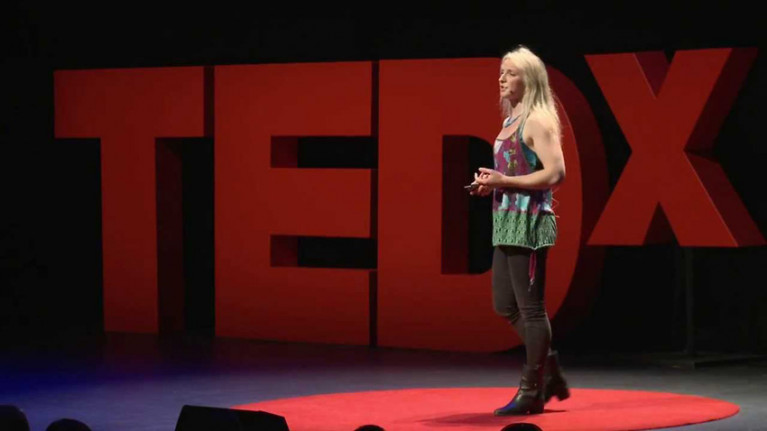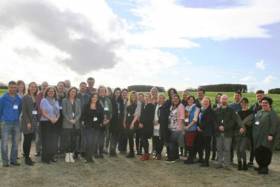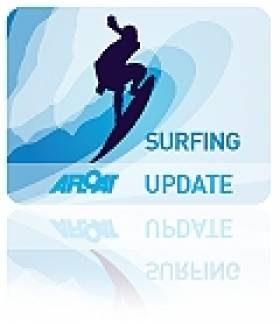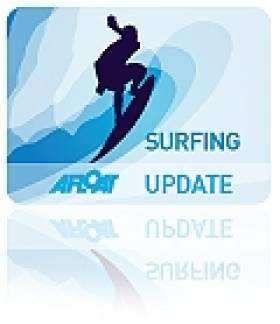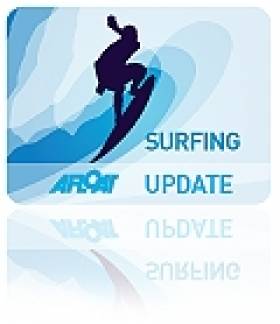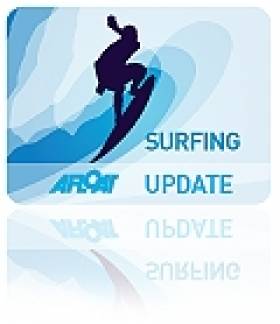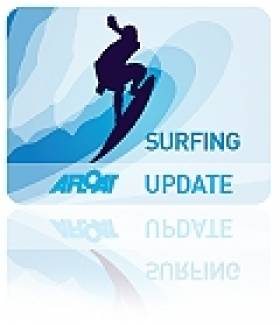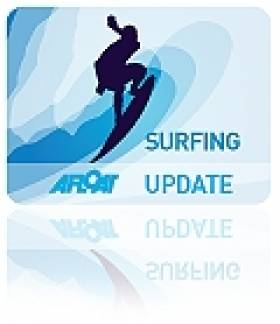Displaying items by tag: Easkey Britton
Surfer-Turned-Scientist Easkey Britton Sees ‘The Power of Telling Your Story’
On the publication of Easkey Britton’s memoir Saltwater in the Blood, the Irish Examiner profiles the former professional surfer-turned-marine scientist whose philosophy has taken on a new significance for many amid the pandemic.
Much as Dr Britton’s current career sees her exploring the relationship between people and the sea, the book explores her own connection to the aquatic environment in its varied facets.
“It is a powerful memoir which sits somewhere in a space between the worlds of the surfer and the academic, the artist and the competitor, the big wave surfer and the environmentalist, the female body and the male-dominated practice of surfing,” the Irish Examiner’s Ruth O’Connor writes.
And as Dr Britton — of the famed Britton surfing clan of Donegal — says herself: “I can see the power of telling your story in a way that can help and inspire others, regardless of what sector or sport you are in.”
The Irish Examiner has much more on this interview HERE.
Marine Scientist Easkey Britton Is Still ‘In A Surfing Way Of Life’
Despite her move into academia, Easkey Britton says she is still “in a surfing way of life”.
The Donegal-reared women’s surfing pioneer was recently profiled by BBC Sport, and explained how her experiences on the waves put her “on the front line of changes that are happening on the marine environment”.
She also acknowledges the “powerful and cultural connection” between people and the environment that surfing can create — something of which she has first-hand knowledge in bringing women’s surfing to Iran nearly a decade ago.
“It’s the feeling and the connection that you are after,” she says of the ocean’s pull. “When people have those kinds of experiences, there's an openness.”
BBC Sport has more on the story HERE.
Irish Ocean Literacy Network Meeting Shapes The Conversation About Our Oceans & Human Health
The Irish Ocean Literacy Network held its sixth national meeting last Wednesday 20 February at the Marine Institute in Galway, where keynote speakers Dr Easkey Britton — surfer and post doc fellow at NUI Galway — and filmmaker Ken O’Sullivan of Sea Fever Productions spoke about the importance the ocean has on our lives as islanders.
Speaking at the event as chair, Cushla Dromgool-Regan of the Marine Institute welcomed having two distinguished guest speakers, highlighting the importance of recognising Ireland’s rich maritime heritage and being able to share our stories.
“As an island nation we are extremely lucky to have a wealth of experts from all walks of life willing to share their experiences with the wider marine community,” she said.
“From being able to see a whale and its calf close up in Irish waters through Ken’s film work, to watching children learning to surf for the first time with Easkey, reminds us of the diversity and importance of our maritime heritage and looking after our ocean for future generations.”
Easkey Briton is widely recognised for her international achievements in surfing is currently completing a post-doctoral research fellow with the EU-Horizon 2020 project Seas, Oceans and Public Health in Europe (SOPHIE).
Growing up in a family of surfers, Easkey talked about how her life passion for the water has brought her in a full cycle, where much of her research as a social scientist has been about the environment and society.
“Bringing people together through community outreach to working with a range of stakeholders in my current research highlights how we all value the ocean in different ways, yet together we all seem to understand the importance of linking our ocean with human health,” Easkey said.
Filmmaker Ken O’Sullivan also spoke at the event sharing his love of the ocean. Coming from a family of fishermen and then learning to dive opened up a new world of discovery for Ken at a young age, where he stated “exploring the ocean as a child with no limitations was like living the life to what might be similar to Huckleberry Finn. Now making a career out of filming wildlife and creative documentaries in the most extreme environments has been a life of adventures.”
Ken O’Sullivan set up Sea Fever Productions in 2006 with Katrina Costello to produce wildlife and creative documentaries. In 2018 they produced Ireland’s Deep Atlantic, a hugely ambitious ocean natural history series searching for blue whales and cold water coral reefs in the deep waters of the North Atlantic, documenting habitats and whale and shark behaviour for the first time ever.
“I have worked with a range of people who have contact with the ocean from fishermen, whale watchers to marine researchers and scientists during their deep sea expeditions, [and] coupled with the development of filming technology, [it] has provided an incredible opportunity to capture footage of marine life right at our doorstep,” Ken said.
“The feedback from the public who have seen my work has been extremely rewarding, particularly from those who are seeing marine life in Irish waters for the first time.”
With a wide range of ocean champions promoting ocean engagement across the island of Ireland, the Irish Ocean Literacy Network says it has seen a significant growth in the last six months, with nearly 100 members representing individuals, small businesses, outreach and education specialists, researchers, NGOs, State agencies and Government departments throughout Ireland.
Garry Kendellen, secretariat of the network, said: “With the recent growth of the IOLN membership, it is encouraging see a sense of the ocean community in one room.
“Our network is a truly eclectic mix of people, who share a similar passion for the ocean. From community outreach to larger national collaborations, it is great to see so many members willing to share their experiences with the network, providing advice and inspiring new collaborations and ideas.”
During the strategic workshop run by David Murphy of AquaTT, he noted: “As an island nation we are in a unique position to help contribute to the national and international efforts to increase peoples understanding and engagement about the ocean.
“We are all individuals who bring something new to the network, yet working together as a collective highlights the importance of creating impactful actions and messaging promoting our ocean from coast to coast.”
The Irish Ocean Literacy Network holds four membership meetings per year where attendees are able to meet other ocean champions who are keen to raise awareness and engagement about the ocean in Ireland. Membership is currently free and if you are interested in learning more, contact [email protected].
The Marine Institute are funders of the Irish Ocean Literacy Network secretariat, which was awarded to Galway Atlantaquaria from 2018-2020. This aims to supports the institute’s Strategic Plan 2018-2022, Building Ocean Knowledge – Delivering Ocean Services, as well as the Government’s marine strategy Harnessing Our Ocean Wealth, whereby it aims to increase awareness of the value, opportunities and societal benefits of our ocean, as well as raising peoples engagement with the ocean.
Surfing Pioneer Gives Keynote At Adventure Tourism Conference
#Adventure - Pioneering Irish surfer Easkey Britton was keynote speaker at the fifth annual International Adventure Conference in Tralee last week, as The Kerryman reports.
The event attracted experts from as far afield as New Zealand for three days of talks on the future of adventure tourism – plus a number of outdoor excursions.
Kerry aims to compete with the likes of Donegal in the increasingly popular adventure tourism stakes, which comprise such white-knuckle activities as surfing, sea kayaking and climbing along Ireland’s rugged coasts.
Donegal recently hosted the 50th anniversary of surfing’s arrival in Ireland, and RTÉ’s Barry O’Neill was on hand to discover how the sport has contributed to the lives of often distant coastal communities.
Easkey Britton's Pioneering Surf Trip To Iran Inspires New Film
#Surfing - The inspirational story of Easkey Britton's pioneering surfing trip to Iran is now part of a new film exploring how the sport is empowering women in the Middle East.
Two years ago, Afloat.ie reported on Britton's adventures in southern Iran, where she was filmed by French documentary maker Marion Poizeau as she took to the waves in a full-length 'hijab swimsuit' – becoming the first woman to surf in the country's waters.
Since then she's set up Waves of Freedom, with the aim of encouraging the women and youth of the remote Baluchistan region of Iran to get into surfing.
And she's been joined by Poizeau, whose new documentary Into the Sea weaves Britton's story together with those of two women her trip inspired: Iranian snowboarder Mona and diver Shalha.
Both have taken Britton's lead in introducing surfing to everyone in Iran, but especially women and girls – sharing "a belief in the power of sport to break down barriers and connect with others".
The 52-minute films is available to download or watch on demand at Vimeo.
Easkey Britton To Set Up Iran's First Ever Surfing Club
#Surfing - The Irish Examiner reports on Easkey Britton's plans to return to Iran this month to establish that country's first ever surf club.
The Donegal surfing champ made history in 2011 when she became the first woman ever to surf in Iran – an extraordinary adventure that was documented by French filmmaker Marion Poizeau.
Since then she's founded Waves of Freedom, a scheme dedicated to teaching women of the remote Baluchistan region how to surf, and she returned to Iran with Poizeau, who shot more footage for a documentary feature, Into The Sea, currently doing the film festival rounds.
Now Britton's going back to the port town of Chabahar on the Makran Coast to help local surfing women set up the country's first surfing club for girls and boys.
And in doing so she's carrying on the pioneering spirit of her father Barry and his brothers Willie, Conor and Brian, who built the foundation of Ireland's own surfing community.
The Irish Examiner has much more on the story HERE.
Surf Pro Easkey Britton Relates The Shape She's In
#Surfing - Irish surfing 'game changer' Easkey Britton shares some of the secrets of her day-to-day life with the Irish Examiner's 'Shape I'm In' column this weekend.
Britton - who made waves last year via a film that documented her history-making surf trip to Iran - is constantly busy, which her post-PhD work in sustainable fisheries taking her away from home a lot.
But the 28-year-old seems able to manage it all and stay grounded thanks to the benefits of surfing, which keeps her physically and mentally strong.
The Irish Examiner has more on the story HERE.
Easkey Britton Talks Surfing Across Barriers In Iran
#Surfing - Surfing has the power to bring people together across cultural and gender barriers, according to Easkey Britton, whose talk at the recent TEDxDublin event has now been posted online.
"It's as if the salt water literally dissolves those barriers and fears we carry with us when we're on land," she says of taking to the waves and immersing in the power of nature, "and we're no longer separate but a part of it all."
Surfing also helps people to get out of their comfort zone - something Britton knows all about after becoming the first woman to surf the waters of Iran last year.
Travelling to the remote province of Baluchestan in south-eastern Iran initially in search of new waves to ride, Britton - of the famed Donegal surfing dynasty - explains how her mission quickly changed to one of connecting with people through surfing.
She recently returned to the region - three years after her first visit with a documentary crew in tow - to find she's sparked something of a quiet revolution in the area, which now boasts a surfing programme to get both men and women out on the waves.
See footage from Easkey Britton's original trip to Iran below:
Easkey Britton Praises New Account of Surfing in Ireland
#SURFING - A new book that delves into the world of surfing in Ireland gets a thumbs-up review from surf pro Easkey Britton in The Irish Times.
Cliffs of Insanity, by Irish Times sportswriter Keith Duggan, focuses on the close-knit surfing community in Lahinch, Co Clare - one of the many hotspots along the west coast that have produced such Irish big wave sensations as Ollie O'Flaherty and overseas visitors like Devon's Andrew Cotton (featured in the video above).
Britton - in the news herself recently for her pioneering surf trip to Iran - notes the passion among Ireland's surfers "to pursue a challenging vocation, one that is raw and unglamorous, set against the icy waters of the Atlantic" towered over by the Cliffs of Moher - the 'cliffs of insanity' of the title.
She also describes the book's central story - the progress of Mayo man Fergal Smith and Cornwall native Mickey Smith as they surf the uncompromising Aileens break - as "a story of hope for an island nation on its knees".
"Duggan presents a rare and intimate window into a little-understood world," she writes. "The ocean and the art of wave riding run so deep in our veins that when you ask a surfer to describe what it feels like we struggle to put it into words."
The Donegal surfing star adds that Duggan "is uniquely positioned as an 'outsider' looking in, and he captures what it is that drives these surfing souls, describing it as 'an elemental pull'."
The Irish Times has more on the story HERE.
Easkey Britton Makes Waves in Iran for New Documentary
#SURFING - A documentary charting Easkey Britton's history-making surfing trip to Iran will premiere on French TV later this month, according to The Irish Times.
The hour-long film was shot by French filmmaker Marion Poizeau during the Donegal surf champion's visit in September last year to Chabahar, a coastal town in southern Iran on the Pakistan border.
Britton - of the northwest surfing dynasty - became the first woman ever to surf in Iran when she donned a full-length 'hijab swimsuit' and took to the waves in near 40 degree temperatures - attracting much attention from the locals.
“Iran is not known as a surf destination," she says, "but experiencing a country through surf gives you a different perspective. It was a leap into the unknown, but I thought I’d give it a go.”
Britton is now hoping to encourage more women and girls in the Middle East to take up surfing, noting its growing popularity in the Gaza Strip.
The Irish Times has more on the story HERE.


























